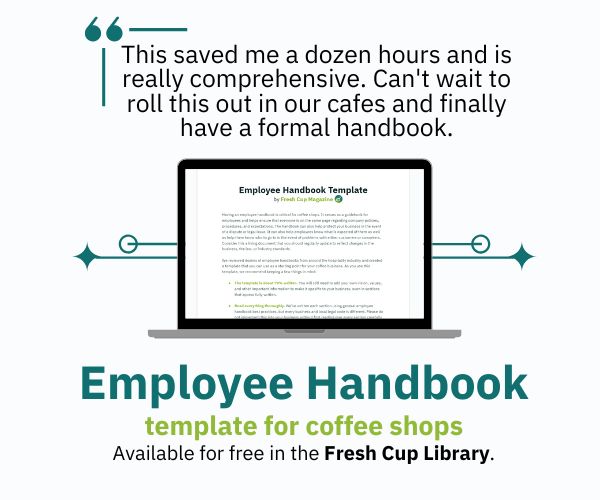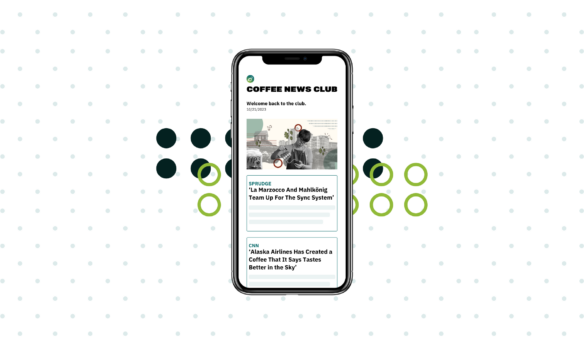Krispy Kreme agrees to pay nearly $1.2 million in back wages. Plus, Colombia again considers leaving the commodity coffee market, Peet’s Coffee workers move to unionize, and caffeine could help you run really, really fast.
‘Krispy Kreme to Pay $1.18 Million in Back Wages Following Labor Investigation’ – via Daily Coffee News
If you were going by the sheer number of news reports, rampant shoplifting has plagued brick-and-mortar businesses over the past few years, causing many chains to close locations. These stories have all added to the recent US crime wave panic, something that Starbucks and outgoing CEO Howard Schultz have alluded to in justifying closing stores, many of which had coincidentally voted to unionize.
What’s less reported is the sheer scale of theft by corporations from workers. In 2012, the value of property stolen in robberies was $341 million, whereas the amount recovered for wage theft victims was at least $933 million. According to various studies, the amount stolen from employees in the form of unpaid overtime or tips totals billions each year.
Case in point: Krispy Kreme agreed to pay nearly $1.2 million in back wages and damages. Krispy Kreme will dole out payments to more than 500 employees after a United States Department of Labor investigation into the company’s overtime violations.
The Labor Department started looking at a single location in Louisville, Kent., but found the violations to be “widespread and systemic” and expanded its investigation to all 242 Krispy Kremes across the country. The probe found that the company failed to include monthly bonuses in some employees’ regular pay rates, allowing Krispy Kreme to pay less overtime to those workers.
“Overtime and minimum wage violations are common violations found in food service industry investigations,” said Principal Deputy Wage and Hour Administrator Jessica Looman.
Krispy Kreme, a multi-billion-dollar company bought in 2016 by JAB Holdings, denies any wrongdoing.
‘Colombia Faces Choice on Dropping NY Reference Coffee Price’ – via Reuters
Roberto Velez, CEO of the National Federation of Coffee Growers (FNC), hinted that Colombia could look to unlink from the New York futures exchange. Instead, the country might look to set its own coffee prices as commodity costs head downward.
As mentioned above, much of the coffee grown globally is traded and sold on the New York futures exchange, which sets a price untethered to quality or labor, called the C-price. Recently, the C-price has fluctuated from a high of $2.50 per pound to as low as $1.67 as optimistic harvest predictions from Brazil point to a possible coffee surplus—and drive prices down.
According to Velez, the news from Brazil will further drive down the price of coffee, putting farmers at risk. The Reuters article suggests that Velez proposed an alternative to C-prices where farmers are paid a fixed price that covers production costs plus a profit margin. Colombian officials originally floated a similar idea in 2019, which could offer farmers more stability and income.
Colombia is the world’s largest supplier of washed arabica coffee. Even though this year’s expected harvest of 12 million 60-kg bags will be the lowest in eight years, current (and past) fluctuations to the C-price will have enormous consequences. However, as Reuters notes, Velez didn’t explain how Colombia could force buyers to work within a new system.
Velez urged people to reconsider how farmers are paid in 2019 when the C price hovered at $1 per pound. Velez floated the same idea—to pull out the New York Stock Exchange—saying, “Colombian coffee growers cannot continue to be beggars, that is not our coffee farming.” Coffee buyers reacted strongly to Velez’s comments, suggesting they would look to other suppliers if Colombia tried to go outside the C price mechanism.
Incidentally, Velez announced his resignation last week. He had been at the helm of the FNC for seven years, and a replacement will be elected when the national congress of coffee growers meets in the next few months.
‘Tom Hanks Launched a New Coffee Brand to Support Veterans’ – via Food & Wine
Celebrity coffee brands continue to cause a splash—now we’re getting one from America’s dad, Tom Hanks. The company, called Hanx Coffee, will raise money for US veterans and their families, with all profits going to several partner organizations. “Good products for good reason,” Hanks is quoted as saying on the company’s website.
Hanks is well known for his role as an Army Rangers Captain in Saving Private Ryan (1998) and as a creator of the miniseries Band of Brothers (2001). Away from the screen, he has served as the campaign chair of the Hidden Heroes Campaign, which seeks to support military caregivers, and as the national spokesperson for the World War II Memorial Campaign.
It isn’t clear who is doing the roasting for Hanx—the website’s FAQ says that roasting takes place in Arkansas and California—and other coffee information is similarly scarce. There are two blends, available ground only, several pod flavors, and something called “coffee sticks,” which appear to be sachets of instant coffee.
What else isn’t clear is the why. Why start a coffee company—or at least a coffee brand—to raise money when you are, by some estimations, worth $400 million? Wouldn’t it be quicker and easier to write a check?
Hanx Coffee joins a motley crew of celebrities with coffee brands: Hugh Jackman with Laughing Man Coffee, Jimmy Butler’s Big Face Coffee, and Aerosmith drummer Joey Kramer’s Rockin’ & Roastin’. Rapper Jadakiss recently started Kiss Café with his son and his father. Youtubers Emma Chamberlain, Sean McCloughlin/Jacksepticeye, and Peter McKinnon all have their own coffees, as do writer siblings John and Hank Green. There are also multiple rock bands with coffee brands.
Now add to this list Oscar- and Emmy-winning actor and possibly the most beloved celebrity in the United States, Tom Hanks.
More News
‘Costa Rica Coffee Exports Dip 43% in November’ – via Nasdaq
‘Some Like It Hot: Study Identifies Consumer Preferences for Coffee Temperatures’ – via Daily Coffee News
‘Coffee Prices Jump as Food Inflation Hits New High’ – via BBC News
‘Coffee Giants Report Mixed Performance in 2022’ – via STiR Magazine
‘2023 National Coffee Association Convention Heading to Tampa’ – via Daily Coffee News
‘Cafe Imports Switches To 100% Compostable Bags For Green Coffee Samples’ – via Sprudge
The Week in Coffee Unionizing
Two Peet’s Coffee locations in California have filed to unionize, inspired—and assisted—by the Starbucks Workers United union. Among their reasons for unionizing, workers cite poor staffing, low pay, inconsistent scheduling, and a general desire for more workplace democracy.
“We’re being expected to push past our limits constantly,” Peet’s organizer Alexa Land told the Daily Beast. “I want me and my co-workers to be able to sustainably do our jobs, without burning out, without getting sick all the time.”
Peet’s workers reached out to the Starbucks union in July for advice and assistance. “They’re doing the ground-breaking stuff and we’re seeing the template for how it could be done,” Land said.
“I think it has the same potential to spread quite quickly, the same as the Starbucks campaign did,” says John Logan, a San Francisco State professor who notes that the significance of this move shouldn’t be understated. Although several small chains have organized over the past few years, Peet’s 200+ stores in the US mean it’s a different prospect entirely.
How JAB Holdings-owned Peet’s responds will be crucial, Logan says. “They could distinguish themselves as a company that respects labor rights and workers’ right to choose.”
Meanwhile, in other union news this week:
- It looks as if the Darwin’s Ltd union push is over. Amid ongoing negotiations, the owners of the Cambridge, Mass., coffee shop announced they would be shuttering all four of the chain’s stores. Plans for a union started in September 2021, inspired by the successful organization of nearby Pavement Coffeehouse. The Darwin’s United union posted a thank-you on Twitter, saying they were “deeply saddened and disappointed” by the news.
- Workers at the Little Dog Coffee Shop in Brunswick, ME, have voted to form a union. Staff cited wages, food safety, and lack of transparency from ownership as reasons behind the drive, which will see them join the national union Workers United.
Is Coffee Good For You?
Coffee could make you run faster—granted, you might need to be an elite-level athlete, but every little bit helps.
A new study from Japan investigated the effects of caffeine on 100-meter sprint runners and found that those who consumed caffeine ran faster than those who did not.
Published in Medicine & Science in Sports & Exercise, the study put 13 college-age sprinters through timed running tests. Before the tests, athletes were given either a moderate dose of caffeine (6 mg per kg of body weight) or a placebo. The study found that those who took the caffeine dose finished their 100-meter sprint 0.14 seconds faster than those who took the placebo.
While it doesn’t sound like a lot, for professional sprinters, 0.14 seconds can be the difference between first and sixth place.
Despite the general prohibition of performance-enhancing drugs in international sport, caffeine is an exception. Caffeine was banned for several decades, but it was eventually permitted due to its pervasiveness and difficulty to test for. The International Association of Athletics Federations even recommends that track and field athletes use caffeine to optimize performance.
This study “serves as evidence to directly support the recommendations for caffeine usage by World Athletics,” said lead author Professor Takeshi Hashimoto from Ritsumeikan University. “The study thus provides one more advantage that athletes can use to inch themselves closer towards victory.”
Beyond the Headlines
‘The Promise and Perils of Our Coffee Future’ by Bethany Haye
‘In Defense of Dark Roasts’ by Fionn Pooler
‘Column: To Make It Rain, Plant More Coffee Trees’ by Sam Knowlton
‘Starbucks Is Acting Like They’re Too Big To Fail’ by Ashley Rodriguez
Coffee News Club is written by Fionn Pooler and the Fresh Cup editorial team.















